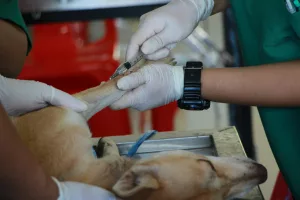Ferrets are playful and social animals that often exhibit a unique behavior known as ‘dooking’ while playing. This high-pitched, happy noise may seem peculiar to those unfamiliar with ferrets, but it serves an important purpose in the ferret world. When a ferret dooks, it is a sign of excitement, joy, and contentment. This vocalization is often accompanied by playful behavior such as running, hopping, and wrestling with other ferrets or toys. Dooking is a natural part of a ferret’s communication repertoire and is considered a positive indicator of their overall well-being. Understanding the nuances of dooking requires a closer look at ferret behavior and the environment they thrive in. Let’s dive deeper into the science, social aspects, and individual nuances of this intriguing ferret behavior.
The Science Behind Dooking
Researchers believe that dooking in ferrets is linked to the release of endorphins in their brains. Endorphins are neurotransmitters that act as natural painkillers and mood regulators. When a ferret engages in playful activities and experiences positive stimuli, their brain releases endorphins, leading to feelings of pleasure and happiness. This is similar to the “runner’s high” that humans experience after physical exercise.
How Dooking Relates to Ferret Physiology
Ferrets, like many mammals, have a complex nervous system that responds to stimuli in their environment. When a ferret is in a playful state, its body undergoes a series of physiological changes:
- Increased Heart Rate: During play, a ferret’s heart rate increases, which boosts blood circulation and enhances the release of endorphins.
- Enhanced Sensory Perception: The heightened state of play enhances a ferret’s sensory perception, making them more responsive to their surroundings.
- Muscle Engagement: Physical activities like jumping and wrestling engage various muscle groups, contributing to overall health and well-being.
Understanding these physiological responses can help ferret owners create environments that encourage healthy play and emotional expression through dooking.
Social Bonding Through Dooking
Dooking may also serve as a form of social bonding among ferrets. In the wild, ferrets communicate with each other through a variety of vocalizations, including dooking, to establish and maintain social connections. By dooking while playing, ferrets are reinforcing their social relationships and strengthening their bonds with their companions.
Observing Ferret Interactions
When observing ferret interactions, you might notice:
- Group Dynamics: Ferrets often play in groups, and dooking may occur more frequently in the presence of familiar playmates as a way to strengthen social ties.
- Role of Hierarchy: In a multi-ferret household, dooking can be part of establishing and negotiating social hierarchies. It’s not uncommon for a more dominant ferret to initiate play, followed by vocalizations that indicate acceptance and enjoyment from the group.
These observations highlight the importance of socialization in ferrets and how dooking contributes to their social structure.
The Role of Play in Ferret Behavior
Play is an essential component of a ferret’s life and serves multiple purposes beyond just entertainment. Through play, ferrets develop important physical skills, such as agility, coordination, and strength. Additionally, play allows ferrets to engage in social interactions, learn appropriate social behaviors, and establish hierarchies within their group.
Physical and Mental Benefits of Play
Engaging in play provides both physical and mental stimulation for ferrets. Here’s how:
- Physical Exercise: Regular play helps maintain a healthy weight, improves cardiovascular health, and keeps their muscles strong.
- Mental Stimulation: Playful activities challenge their brains, keeping them sharp and reducing the risk of cognitive decline.
- Emotional Well-being: Play reduces stress and anxiety by allowing ferrets to express their emotions freely.
Creating a Stimulating Play Environment
To support a ferret’s need for play, consider these tips:
- Variety of Toys: Provide a range of toys, such as tunnels, balls, and interactive puzzles, to keep your ferret engaged.
- Safe Play Area: Ensure that the play area is safe and free from hazards like small objects that could be swallowed.
- Scheduled Playtime: Establish regular play sessions to keep your ferret active and prevent boredom.
Understanding Your Ferret’s Individuality
It’s important to remember that each ferret is a unique individual with their own preferences, personality, and communication style. Some ferrets may dook more frequently and loudly than others, while some may dook only in specific situations or with certain playmates. By observing and understanding your ferret’s behavior, you can gain insight into their emotions, needs, and desires.
Recognizing Unique Traits
Here are a few ways to identify and appreciate your ferret’s individual personality:
- Dooking Patterns: Some ferrets may have a distinct dooking pattern, such as a certain sequence of sounds or volume changes.
- Preferred Playmates: Pay attention to whether your ferret has a favorite playmate or toy that triggers more enthusiastic dooking.
- Behavioral Changes: Notice if your ferret’s dooking behavior changes in response to different environments or situations, which can provide clues about their comfort levels and preferences.
Enhancing Your Bond with Your Ferret
To deepen your connection with your ferret, consider these strategies:
- Interactive Play: Engage in interactive play that mimics natural behaviors, such as chasing or hide-and-seek.
- Positive Reinforcement: Use treats and affection to reward your ferret when they engage in desirable behaviors like dooking during play.
- Consistent Routine: Establish a consistent routine to help your ferret feel secure and comfortable, which can encourage more frequent dooking.
Common Mistakes and How to Avoid Them
While ferret owners often have the best intentions, there are common mistakes that can hinder a ferret’s ability to express themselves through dooking.
Mistakes to Avoid
- Lack of Stimulation: Failing to provide enough toys or interactive opportunities can lead to boredom and reduced dooking.
- Overcrowding: Keeping too many ferrets in a limited space can cause stress and reduce the likelihood of playful interactions.
- Ignoring Health Issues: Sometimes a decrease in dooking can be a sign of underlying health problems. Regular veterinary check-ups are essential.
Actionable Solutions
- Rotate Toys: Regularly introduce new toys to prevent boredom and keep playtime exciting.
- Monitor Interactions: Observe group dynamics to ensure all ferrets have the opportunity to express themselves and participate in play.
- Health Monitoring: Be vigilant about changes in behavior and consult a vet if you notice any concerning signs.
Creating the Ideal Environment for Dooking
Creating an environment that fosters dooking involves more than just providing toys. It’s about understanding the holistic needs of your ferret and ensuring their surroundings encourage natural behaviors.
Setting Up Their Space
- Enclosures: Ensure your ferret has ample space to explore, with different levels and areas to climb or hide. Ferrets love to investigate, and a stimulating environment can lead to more frequent dooking.
- Natural Elements: Incorporate natural elements like wooden tunnels or fabric hammocks to mimic their wild habitat, encouraging behaviors associated with joy and comfort.
- Regular Updates: Change up the layout of their space regularly to introduce new challenges and prevent monotony.
Social Enrichment
- Companionship: Ferrets are social creatures and thrive when they have company. Consider having more than one ferret to promote social play and dooking.
- Human Interaction: Spend time playing and interacting with your ferret daily. Your presence can be a significant source of joy and stimulation for them.
- Play Dates: If possible, arrange playdates with other ferrets to expand their social circle and introduce new dynamics.
Observational Insights: What Dooking Tells Us
Observing your ferret’s dooking can provide valuable insights into their well-being and happiness.
Behavioral Indicators
- Frequency and Intensity: Regular and intense dooking indicates a happy and well-adjusted ferret. A sudden decrease might point to stress or health issues.
- Contextual Cues: Pay attention to what triggers dooking. Is it a specific toy, a particular time of day, or interaction with another ferret? These cues can help you understand what your ferret enjoys most.
- Body Language: Combine vocal cues with body language. A ferret that dooks while displaying relaxed or playful body language is likely content and engaged.
Troubleshooting: When Dooking Is Absent
If your ferret isn’t dooking, it might be a sign that something is amiss. Here are some troubleshooting tips:
Environmental Checks
- Assess Their Space: Ensure their environment isn’t too restrictive or lacking in stimulation. A cramped or boring space can lead to decreased playfulness.
- Evaluate Social Needs: Is your ferret getting enough interaction with both humans and other ferrets? Social isolation can dampen their spirits.
Health Considerations
- Check for Illness: Sometimes, a health issue might be the cause. Keep an eye out for other signs of illness, such as lethargy or changes in appetite.
- Stress Factors: Identify any new stressors in their environment, such as changes in routine or new pets, that might affect their behavior.
The Joy of Dooking: A Unique Bond
Dooking is more than just a noise; it’s a glimpse into your ferret’s world and a testament to their joy and playful spirit. By fostering an environment that encourages this behavior, you not only enhance your ferret’s quality of life but also strengthen the bond you share with these charming creatures.
Remember, every dook is a reminder of your ferret’s happiness and comfort in their home. Embrace this unique communication and celebrate the joy it brings to both your ferret’s life and your own. With patience, understanding, and a little bit of creativity, you can create a joyful and enriching life for your ferret, full of dooks, play, and happiness.
Personal Experiences: Stories from Ferret Owners
To bring this information to life, let’s explore some personal stories from ferret owners who have observed the magic of dooking in their pets.
Case Study 1: The Curious Trio
One ferret owner, Jane, shares her experience with her three ferrets—Milo, Luna, and Gizmo. Jane noticed that Milo, the most adventurous of the trio, would initiate play with a dook, prompting the others to join in. Her observations highlight how dooking can signal the start of playtime, encouraging social interaction among ferrets.
Case Study 2: The Shy Dooker
Another owner, Tom, tells the story of his shy ferret, Bella. Initially, Bella was reserved and rarely vocalized. However, as she grew more comfortable in her environment and bonded with Tom, she began dooking more frequently. This transformation underscores the importance of patience and a supportive environment in encouraging natural behaviors.
Enhancing Ferret Well-being Through Play and Interaction
Ferrets thrive in environments that cater to their playful and social nature. Here are some additional strategies to enhance their well-being:
Engaging Activities
- Obstacle Courses: Set up simple obstacle courses using household items to challenge your ferret physically and mentally.
- Interactive Games: Games like fetch or tug-of-war can be adapted for ferrets, providing both exercise and bonding opportunities.
- Hide and Seek: Ferrets love exploring, and a game of hide and seek can stimulate their natural curiosity.
Incorporating Technology
- Ferret Cam: Set up a camera to monitor your ferret’s playtime and interactions. This can help you understand their preferences and ensure they are having fun even when you’re not around.
- Smart Toys: Invest in smart toys that offer various challenges and rewards, keeping your ferret engaged and mentally stimulated.
By understanding the science, social aspects, and individual nuances of dooking, and by creating a supportive environment, you can ensure your ferret lives a joyful and enriched life. Enjoy the delightful sounds of dooking as a testament to your ferret’s happiness and the bond you share.



